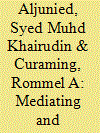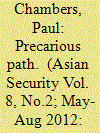| Srl | Item |
| 1 |
ID:
112947


|
|
|
|
|
| Publication |
2012.
|
| Summary/Abstract |
Considered by many as the founding moment of Muslim separatism in Mindanao, the Jabidah massacre, which took place on Corregidor Island, involved the killing of Muslim trainees who were being prepared by the Philippine military in 1967 and 1968 to infiltrate and sabotage neighboring Sabah. This article analyzes the ways by which memories of this iconic event have in the past four decades been recorded, remembered, mythicized, appropriated, or simply consumed for their own purposes by political elites, civil society actors, and ordinary people in the Philippines. Our angle of vision is directed toward what we term "contentious vectors" -news media, novels, films, and blogs-to analyze the processes by which memories are recast. The ways by which the Jabidah massacre is remembered and appropriated reflect the contestations between civil society and the government in the Philippines, as well as the intense rivalry among the political elites both within and between the Christian-elite-dominated Filipino polity and Muslim communities. The struggle to influence the shape of memories of Jabidah is part and parcel of an ongoing struggle to create competing nations-of-intent amidst the persistent tensions between the state and its dissenters.
|
|
|
|
|
|
|
|
|
|
|
|
|
|
|
|
| 2 |
ID:
114747


|
|
|
|
|
| Publication |
2012.
|
| Summary/Abstract |
In the Philippines, the armed forces have played a major role in the country's authoritarian past. Yet despite the advent of democracy, vestiges of authoritarianism have continued to linger. This article analyzes the successes and failures in the efforts of Philippine civilians to gain authority over their military in five areas of political decision making, with the objective of achieving consolidated democratic rule. The article argues that in the Philippines, civilians have made genuine progress in curtailing the influence of military in certain areas, while in others, the armed forces continue to challenge civilian prerogatives. The article concludes that the ability of the Philippine military to continue acting in breach of civilian supremacy in certain areas reflects an impediment to democratically elected authorities' power to govern effectively.
|
|
|
|
|
|
|
|
|
|
|
|
|
|
|
|